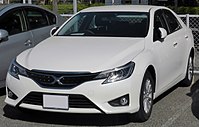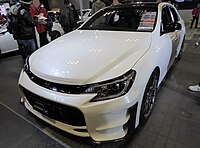Toyota Mark X
| Toyota Mark X | |
|---|---|
 2016 Toyota Mark X 250S (GRX130, Japan) | |
| Overview | |
| Manufacturer | Toyota |
| Also called | Toyota Reiz (China, 2005–2017) |
| Production | November 2004 – December 2019[1][2][3][4] |
| Body and chassis | |
| Class | Mid-size car |
| Body style | 4-door saloon/sedan |
| Layout | |
| Platform | Toyota N platform |
| Chronology | |
| Predecessor | |
The Toyota Mark X (Japanese: トヨタ・マークX, Hepburn: Toyota Māku X) is a mid-size car manufactured by Toyota between 2004 and 2019, and was primarily aimed at the Japanese market. The Mark X was introduced in 2004 and is the successor to the Mark II which was first introduced in 1968, and was known in the North American market as the Corona Mark II starting in 1972, and renamed the Cressida from 1977 to 1992.
The "Mark X" is not pronounced "Mark Ten" but "Mark Ex", though the "Mark II" is "Mark Two". The Mark X is a continuation of the previous Mark II and its siblings, the sport-orientated Chaser, and the luxurious Cresta in one vehicle, repeating an approach previously attempted by the short-lived Verossa that used inline-six engines, whereas the Mark X uses V6 engines.
The Mark X was previously sold as an alternative to the front-wheel drive Camry, which was once the largest new saloon at Corolla Store locations, for buyers who like the size of the Camry, but prefer a rear-wheel drive layout.
Different engine sizes were offered to allow Japanese buyers to choose which annual road tax they were willing to pay; the larger engines offer higher levels of standard equipment and luxury features. Both the first and second generation Mark X were manufactured at the Motomachi plant in Japan.[5]
The Mark X was sold as the Reiz (Chinese: 锐志; pinyin: Ruìzhì) in China, which was produced by Tianjin FAW Toyota Motor Co. Ltd. It was produced until 2017. The Mark X was also officially imported to Indonesia in limited quantities between 2012 and 2013 to replace Australian-built Camrys as premium taxis. However, the plan was scrapped and the already imported units were instead sold to the general public.[6][7]
First generation (X120; 2004)
[edit]| First generation (X120) | |
|---|---|
 2004 Mark X (Japan) | |
| Overview | |
| Model code | X120 |
| Production | November 2004 – October 2009 |
| Assembly |
|
| Powertrain | |
| Engine | |
| Transmission |
|
| Dimensions | |
| Wheelbase | 2,850 mm (112.2 in) |
| Length | 4,730 mm (186.2 in) |
| Width | 1,775 mm (69.9 in) |
| Height | 1,435–1,445 mm (56.5–56.9 in) |
| Kerb weight | 1,510–1,570 kg (3,329–3,461 lb) |
Toyota unveiled the Mark X saloon in 2004 as the successor to the Mark II saloon which has been on the market since 1968. Instead of being based on a modified Supra chassis "A" series platform, the Mark X continues to use the Toyota "X" platform, and does not share its platform with the Toyota "S" series platform used under the Crown and Lexus GS.
The continuation of describing this vehicle as the "X" series is a reference to the first dedicated Mark II platform introduced in 1972. Major changes to the Mark series are the engine and footwork. Toyota discontinued the inline-six engines used in the Verossa which included the JZ series and the G series engines, and went to the newly developed GR series engine. Either the 158 kW (212 hp; 215 PS) 2.5 L (2,497 cc) 4GR-FSE or the 188 kW (252 hp; 256 PS) 3.0 L (2,995 cc) 3GR-FSE engine options were available. It was only available at Toyopet Store Japanese locations to position it as a top-level luxury car. The previous top-level car was the Toyota Celsior, which now assumed the more internationally known Lexus LS and exclusive to Japanese Lexus dealerships.
Both engines offer Dual VVT-i with D-4 direct injection. The rear-wheel-drive models have a 6-speed torque converter automatic transmission as standard, and the iFour four-wheel drive models have a 5-speed automatic. No manual transmission options were offered.
A first in its class is the rear bumper with an integrated exhaust outlet, which later moved to the corresponding model year Lexus LS series and the Crown. An LED lamp for the ceiling runs from the front of the vehicle to the rear, creating a "mood" lighting system. The LED system is also incorporated into the vehicle's gear lever and key area.
Minor changes were made in 2006. Mirror-mounted indicators replaced the wing-mounted units, taillamps were revised, and the grille was redesigned. Mark X, with a black interior colour, deleted the wood trim in favour of the brushed aluminium trim. This change also formalised the introduction of the "S package," which gains the three-spoke steering wheel and changes to the exterior lip piece.
In 2007, for Japanese models only, G-BOOK, a subscription telematics service, was offered as an option.
The former Kanto Auto Works produced the Mark X from November 2004 to September 2006.[10]
-
2004 Mark X (Japan)
-
2006 Mark X (Japan)
-
2006 Mark X (Japan)
-
Interior
China
[edit]The Chinese market Reiz is sold in 2.5 S, 2.5 V and 3.0 V Premium trim levels with 2.5 L (2,497 cc) 5GR-FE and 3.0 L (2,995 cc) 3GR-FE engines.[11]
-
Reiz (pre-facelift, China)
-
Reiz (facelift, China)
-
Rear view
Special versions
[edit]Mark X Supercharged
[edit]The Mark X Supercharged version uses the supercharged 3GR-FSE engine paired to 6-speed automatic transmission.[12] The power output is rated at 235 kW (315 hp; 320 PS) at 6,200 rpm and 412 N⋅m (304 lb⋅ft) of torque at 3,200 rpm.
50th Anniversary Limited Edition
[edit]A limited edition 50th Anniversary Limited Edition Mark X was produced with the Vertiga kit. It has chrome ducts and carbon fibre splitters as standard parts, as well as different suspension tuning.[13]
Engines
[edit]| Engines | ||||||
|---|---|---|---|---|---|---|
| Model | Engine displacement | Engine Code | Power at rpm | Torque at rpm | Weight | Years Sold |
| GRX-120 | 2,499 cc (V6) | 4GR-FSE | 158 kW (215 PS; 212 hp) at 6400 rpm | 260 N⋅m (192 lb⋅ft) at 3800 rpm | 1510 kg (3,329 lb) | 2004-2008 |
| GRX-125 | 4GR-FSE (4WD) | 1570 kg (3,461 lb) | 2004-2008 | |||
| GRX-122 | 2,497 cc (V6) | 5GR-FE (China Only) | 158 kW (215 PS; 212 hp) at 6400 rpm[citation needed] | 243 N⋅m (179 lb⋅ft) at 3800 rpm[citation needed] | 1510 kg (3,329 lb) | 2004-2008 |
| GRX-121 | 2,994 cc (V6) | 3GR-FE (China Only) | 188 kW (256 PS; 252 hp) at 6200 rpm | 243 N⋅m (179 lb⋅ft) at 3600 rpm | 1520 kg (3,351 lb) | 2004, 2006-2008 |
| 3GR-FSE | 1520 kg (3,351 lb) | 2004, 2006-2008 | ||||
| 3GR-FSE (Supercharged) |
235 kW (320 PS; 316 hp) at 6200 rpm | 412 N⋅m (304 lb⋅ft) at 3200 rpm | 1530 kg (3,373 lb) | 2004, 2006-2008 | ||
Second generation (X130; 2009)
[edit]| Second generation (X130) | |
|---|---|
 2009 Mark X 250G "S Package" (GRX130; pre-facelift, Japan) | |
| Overview | |
| Model code | X130 |
| Production | |
| Assembly |
|
| Powertrain | |
| Engine |
|
| Power output |
|
| Transmission | |
| Dimensions | |
| Wheelbase | 2,850 mm (112.2 in) |
| Length | 4,770 mm (187.8 in) |
| Width | 1,795 mm (70.7 in) |
| Height |
|
| Kerb weight | 1,510–1,570 kg (3,329–3,461 lb) |
The second generation Mark X was released on 19 October 2009, followed by the Reiz in September 2010.[15] Engine options are the 149 kW (200 hp; 203 PS) 2.5 L (2,497 cc) 4GR-FSE V6 and the 234 kW (314 hp; 318 PS) 3.5 L (3,456 cc) 2GR-FSE V6. Models available are Standard, Premium and Sports.[16][17][18] Changes from the previous generation include the elimination of the exhaust outlet diffuser, 6-speed automatic transmission for All-Trac 4WD models and return to the hinge design boot instead of lift support.
The Mark X received two facelifts in 2012 and 2016. The 2016 facelift received additional spot welding to strengthen the body. The vehicles also gained "Toyota Safety Sense" consisting of autonomous emergency braking, lane departure alert, automatic high beams and radar cruise control as standard.
Models
[edit]Standard
[edit]The Standard model is the entry-level variant. Available only with the 2.5 L engine, it is available in rear-wheel drive (250G, 250G "F package" and Relax Selection) and four-wheel drive (250G Four, 250G "F package") option. It has an ivory and black interior colour and the option of wood-grain panel colour.[19]
-
2009 Mark X 250G (GRX130; pre-facelift, Japan)
-
2009 Mark X 250G (GRX130; pre-facelift, Japan)
-
2013 Mark X 250G (GRX130; first facelift, Japan)
-
2012 Mark X 250G "S Package" (GRX130; first facelift, Japan)
-
2012 Mark X 250G "S Package" (GRX130; first facelift, Japan)
-
2015 Mark X 250G Yellow Label (GRX130; first facelift, Japan)
-
2015 Mark X 250G Yellow Label (GRX130; first facelift, Japan)
-
First facelift interior
-
2016 Mark X 250G (GRX130; second facelift, Japan)
-
2016 Mark X 250G (GRX130; second facelift, Japan)
-
Reiz (pre-facelift, China)
-
Reiz (facelift, China)
Premium
[edit]This variant is available with the 2.5 L or 3.5 L engine. The exterior differentiates itself from other grades by arranging the mall plated grille, trim specific side skirts and unique front bumper design. It also features a millimetre-wave radar system for cruise control and a pre-crash safety system with brake activation. The seat upholstery is made from Alcantara (with leather being an option). Super UV cut glass and nanoE air ventilation system is also used on this grade.[20] Other features include a retractable rear sunshade, fully automatic self-parking system, driver's power 8-way adjustable seat and passenger 4-way power seat (with inbuilt heating and cooling) and electronically adjustable shock absorbers (Adaptive Variable Suspension System (AVS) which can be controlled from the cabin.[19]
-
2009 Mark X Premium (GRX133; pre-facelift, Japan)
-
2009 Mark X Premium (GRX133; pre-facelift, Japan)
-
2013 Mark X Premium (GRX130; first facelift, Japan)
Sports
[edit]The Sports variant is available as the 250S/250RDS and the 350S/350RDS. It is designed to replace the Tourer V variant from previous models of the X-chassis cars. Standard on the exterior is a rear boot spoiler, rear diffuser and redesigned front and rear bumpers dedicated to improving aerodynamic performance. In addition, it has a smoked coating on the headlamps and taillamps to differentiate itself from the other models. Specific to the 350S is special 18x8J aluminium wheels with 235/45R18 tyres, 334 mm (13.1 in) large-diameter ventilated front brake disks and four-piston "aluminium monobloc callipers" made by ADVICS Co. Unique to the Sports variant is Vehicle Dynamics Integrated Management with variable gear ratio steering which changes the ratio of steering input to wheel movement so as to help low-speed parking as well as remain stable at high speed. Also standard on the 350S is the AVS. This is backed up with other safety features such as VSC, traction control, ABS and EBD.[21][22] Other standard features include aluminium pedals, footrest and steering wheel paddle shifters. Auto tilt-away steering wheel (when the ignition is switched off) is standard on the 3.5 L models only. Driver's power 8-way adjustable seat and passenger 4-way power seat, seat heating and cooling, and leather interior are available as options.[19]
-
2016 Mark X 250RDS (GRX130; second facelift, Japan)
-
2017 Mark X 250RDS (GRX130; second facelift, Japan)
-
Second facelift interior
Special versions
[edit]Sports Plus
[edit]The Sports Plus is a version of the Mark X Sports with a 2.5 L engine, sold in Hong Kong and Macau. It includes front and rear spoilers, front fog lamps, gear shift paddles, electronically controlled suspension, leather seat and front seat heater.[23][24]
Mark X +M Super Charger/Vertiga
[edit]As with the previous generation Mark X, Toyota's in-house tuning company Modellista installed a supercharger on the 3.5 L 2GR-FSE engine and marketed as Mark X +M Super Charger. The power output is rated at 265 kW (355 hp; 360 PS) and 498 N⋅m (367 lb⋅ft) of torque. Modellista also produced a non-supercharged version of the Mark X called Vertiga.[25]
-
Mark X Vertiga (pre-facelift)
-
Mark X +M Super Charger unmarked car (first facelift)
-
Mark X +M Super Charger unmarked car (first facelift)
G's/GR Sport
[edit]The G's (renamed to GR Sport in 2016) variant is based on 250S or 350S models. The G's/GR Sport Mark X is very noticeably distinct with a 3-piece bodykit, rear boot spoiler, clear smoked taillamps, forged aluminium 19x8J wheels, four-piston calipers with 356 mm (14.0 in) front and 310 mm (12.2 in) rear ventilated brake disks, upgraded suspension, red stitching leather interior, carbon style centre console and instrument panel, upgraded Alcantara front seats, etc.
-
2013 Mark X 250G S Package G's (GRX130, Japan)
-
2013 Mark X 350S G's (GRX133, Japan)
-
2019 Mark X 250S GR Sport (GRX130, Japan)
-
2019 Mark X 250S GR Sport (GRX130, Japan)
-
2019 Mark X 250S GR Sport interior
GRMN
[edit]The Mark X GRMN (Gazoo Racing, tuned by the Meister of the Nürburgring) is a limited-production variant (100 units in 2015, 350 units in 2019) based on the 3.5 L model. It has a specific front and rear bumper design (shared with the GR Sport variant for 2019 model), CFRP roof which reduces the weight by approximately 10 kg (22 lb), 19-inch BBS wheels, sports seats and steering wheel, and piano black interior accents with ultra suede upholstery and red contrast stitching. Mechanical upgrades include uprated power output to 236 kW (316 hp; 321 PS) for the 2015 model, 6-speed manual transmission with Torsen limited-slip differential, sport-tuned suspension, high-performance brakes, and additional chassis reinforcements, which include 252 additional chassis spot welds for greater rigidity, coupled with specific-tuned dampers and electric power steering.[14][26][27][28]
-
2015 Mark X GRMN (GRX133, Japan)
-
2015 Mark X GRMN (GRX133, Japan)
-
2019 Mark X GRMN (GRX133, Japan)
-
2019 Mark X GRMN (GRX133, Japan)
-
2019 Mark X GRMN interior
Discontinuation
[edit]On 27 September 2017, Toyota ended production of the Reiz in China[29] with a total of 528,188 units produced since 2004.[30]
Production of the Mark X ended on 23 December 2019 in Japan with a total of 6.9 million units (including the Mark II) produced since the first production of Corona Mark II began 51 years earlier.[31][32] Before the discontinuation, Toyota released the limited-production Mark X 250S Final Edition. The Final Edition comes equipped with 18-inch aluminium wheels, dark chrome-plated front bumper trim, and a red and black interior finished in Alcantara and leather.[3] This marked the end of the Mark II lineage that was introduced in 1968.
-
2019 Mark X 250S Final Edition (GRX130, Japan)
Mark X ZiO
[edit]The Mark X ZiO MPV shares only a name with the Mark X saloon and is based on the smaller front-wheel drive New MC platform.
References
[edit]- ^ a b "TOYOTA、マークXの特別仕様車を発売" [TOYOTA Launches Mark X Special Edition] (Press release). Japan: Toyota. 24 April 2019. Retrieved 26 April 2019.
- ^ a b Tudose, Sergiu (24 April 2019). "Toyota Mark X Final Edition Is The End Of The Road For Iconic JDM Sports Sedan". Carscoops. US. Retrieved 26 April 2019.
- ^ a b c Vanderhorst, Cam (25 April 2019). "Toyota Bids Farewell To A Sedan It's Been Selling Since 1968". Motor1. US. Retrieved 26 April 2019.
- ^ a b Hsu, Ben (3 January 2020). "Toyota has ended 51 years of Mark II, Mark X production". Japanese Nostalgic Car. US. Retrieved 8 January 2020.
- ^ "Product manufacture". Archived from the original on 12 November 2007. Retrieved 13 April 2010.
- ^ Harvenda, Aris F (13 November 2020). "Toyota Mark X Tidak Cocok Sebagai Taksi Premium" [Toyota Mark X Is Not Suitable As A Premium Taxi]. Kompas (in Indonesian). Indonesia. Retrieved 29 January 2020.
- ^ "Toyota Mark X Gagal Jadi Taksi Mewah, Ini Alasannya" [Toyota Mark X failed as a luxury taxi, here is the reason]. detikOto (in Indonesian). detikcom. 23 January 2013. Archived from the original on 15 January 2020.
- ^ "Japanese Production Sites". Toyota. 6 March 2015. Archived from the original on 18 March 2015.
- ^ "History of KANTO AUTO WORKS". Kanto-aw.co.jp. Retrieved 16 July 2010.
- ^ "Affiliates (Toyota wholly-owned subsidiaries)-Toyota Motor East Japan, Inc". Toyota Motor Corporation. 2012. Retrieved 21 July 2014.
- ^ "Reiz specs" (in Chinese). Retrieved 2 March 2010.
- ^ "MARK X Super Charger". 29 October 2006. Archived from the original on 29 October 2006. Retrieved 29 October 2006.
- ^ "Mark X 50th Anniversary Limited Edition Pictures". Archived from the original on 2 November 2010. Retrieved 17 August 2010.
- ^ a b Gauthier, Michael (23 December 2014). "2015 Toyota Mark X GRMN unveiled". Motor1. US. Retrieved 31 December 2019.
- ^ "FAW-Toyota Releases 2011 Reiz". ChinaAutoWeb.com.
- ^ "MARK X spec". 1 October 2009. Archived from the original on 3 December 2009. Retrieved 23 October 2009.
- ^ New Toyota Mark X: official details and photos
- ^ Toyota Mark X rendering: New model to arrive in October
- ^ a b c "トヨタ自動車WEBサイト" [Toyota Motor Website] (in Japanese). Japan: Toyota. Retrieved 31 December 2019.
- ^ "マークX | インテリア | ユーティリティ・居住性 | フロントビュー" [Mark X | Interior | Utility / Comfort | Front View] (in Japanese). Japan: Toyota. Archived from the original on 1 September 2012.
- ^ "マークX | スペック | 主要装備 | 一覧表" [Mark X | Spec | Main equipment | List] (in Japanese). Japan: Toyota. Retrieved 2 October 2013.
- ^ "マークX | 安全性能 | 予防安全" [Mark X | Safety Performance | Preventive Safety] (in Japanese). Japan: Toyota. Archived from the original on 29 August 2012.
- ^ "The Most Desirable, for Enjoyment of Precision First-Time Overseas Debut of the All-new Toyota Mark X" (PDF). YatFung Motors. Retrieved 21 March 2012.
- ^ "Toyota Mark X Sport Plus". YatFung Motors. Retrieved 21 March 2012.
- ^ "Mark X "Vertiga"". 1 October 2009. Retrieved 23 October 2009.
- ^ "Toyota Unveils Limited 2015 Mark X GRMN in Japan [Video][Photo Gallery]". Archived from the original on 26 December 2014.
- ^ "Toyota Mark X GRMN edition returns as a Japan-only taunt - Drive".
- ^ "Toyota Mark X Revealed: Naturally Aspirated V6, Manual Gearbox".
- ^ "丰田章男眼看丰田的后驱车没落,最后阵地"锐志"也如期而至停产" [Akio Toyota saw Toyota's rear-wheel drive decline, the last Reiz has been scheduled to end production]. Sina Auto (in Chinese). China. 29 May 2018. Retrieved 23 June 2018.
- ^ "第528188辆下线 一汽丰田锐志正式停产" [The 528,188 vehicles went offline. FAW Toyota Reiz officially stopped production.]. xcar (in Chinese). China. 28 September 2017. Retrieved 8 September 2018.
- ^ "Toyota Ends Production of Mark X Luxury Sedan". Nippon.com. Japan. 24 December 2019. Retrieved 24 December 2019.
- ^ "トヨタ自動車、マークX 最後の1台をラインオフ…コロナマークII から51年、690万台[ヒストリー]" [Toyota, Mark X last one line off line ... Corona Mark II, 51 years, 6.9 million units [History]]. Response. Japan. 24 December 2019. Retrieved 25 December 2019.







































